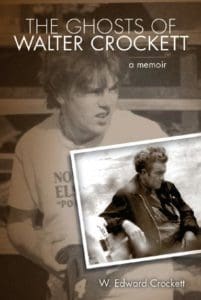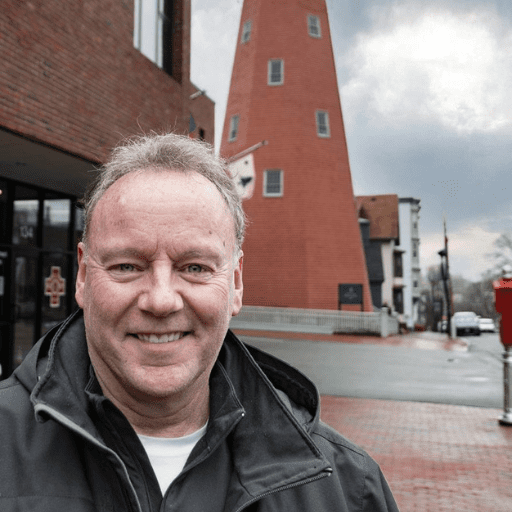In 1963, Ed Crockett was 2 years old, the youngest of eight children living on Munjoy Hill, with a father that the Portland Press Herald called “the biggest drunk in Portland.”
Ed’s mother Virginia made the “incredibly courageous” decision to ask the father of her youngest three children to leave so that she could collect welfare. Walter Crockett was out on his own.
Sounds pretty grim, but this story is about Ed reconnecting with his father after 30 years. And it has a happy ending.
Ed felt safe growing up with his siblings and small, familiar Munjoy neighborhood. His mother, siblings and grandparents were strong protectors.
But he was not blind to the difficulties his family, and many families around him, were facing. Poverty and proof of a very vicious cycle were all around him.
“A constant reminder of my dad’s fate was ever present in my head and, I’m sure, in my siblings’ heads,” Ed said. Ed and his siblings were left to dream about what their father was contending with while he was out of the house. While kids will be kids, there was always a fear of becoming like their father.
Walter Crockett was a Korean War veteran who lived on the streets of Portland for 17 years. It took a lot of in and out of facilities for Walter to stay straight. He had been given his last rites five times, and kept on fighting.
He had run-ins with the law, which typically resulted in a cell to sleep in for the night, or time trying to dry out in what was then called Togus VA Medical Center in Chelsea. It was there that Walter met Anne Bundy, his second wife and “guardian angel.” With her love and support, Walter seriously entered recovery and attempted to connect with his family.
The couple moved to Orono so that Anne could get her master’s degree while Ed happened to be in college there, too.
Walter finally worked up the courage to engage with his younger son, and that was the beginning of a long overdue relationship.
“One thing I’ve always admired –maybe too late – about my dad is he didn’t force anything,” Ed said. “He was almost too humble. I think a lot of it was fear. And there were times I would’ve liked to see him be more aggressive, but now I can step back and say, ‘Well, can you imagine what was going on in his head?’”
It took some time for Ed to let his father back into his life, to learn to trust someone he hadn’t expected to have in his life. He started creating new, positive memories of a man with whom he’d previously had no positive memories.
Most importantly, he learned that addiction was not a choice, but a ravaging disease.
“The most beautiful thing that I got out of it was that he softened me. He softened me greatly. I really give him a lot of credit for teaching me how to forgive because I wasn’t in any mood to forgive.”
Father and son had 30 good years together before Walter Crockett passed in 2012. He was a recovering alcoholic, an Alcoholics Anonymous mentor who knew how to listen, a loving husband and father, and a “beautiful” grandfather.
“My dad’s real legacy is what he did – one, by recovering, and two, by what he did in recovery. And we [the family] would joke in his sobriety that nobody would believe his story unless it was on the big screen.”
After his father’s passing, Ed began writing his father’s story.
It ultimately also became a story of Portland all those years ago, and a loving homage to his family – not only Ed’s father and siblings, but especially to his mother. She had demonstrated strength and faith to her children, working hard to provide for them and protect them. Ed credits Virginia for much of his grace in forgiving his father. She never discouraged her children from being in contact with their father.
She understood that Walter was dealing with a disease, one that wasn’t going to go away on its own but was not a mark against him.
Her grace could not protect her children from embarrassment, but it did protect them from harboring anger toward Walter and from taking too many risks. Ed and his siblings were raised to value hard work, education and family.
The Ghosts of Walter Crockett was published by Islandport Press in November 2021.

“I think it’s important that we stress this story because, although the story itself is very unique, the fact is that people do recover and become great contributors to their families and their communities,” Ed said. “There’s a lot of those stories. We just don’t hear about it.
“So maybe this story can be used as an example. Because, to me, the story’s about those that are fighting this beast and are trying to get better – and less about us.”
Walter Crockett is proof that difficult change is possible and that so much of what addiction takes away, recovery can return to us.
Ed’s mother and grandparents are proof that it takes a village. Ed’s siblings are proof that vicious cycles end.
And Ed is proof that when we soften our edges and share our stories, beautiful things can happen. When Ed was working on the book, he sent a few copies out to family for a first reading. The book was for them, after all. A sibling asked him why he wanted to tell all this personal stuff.
“My answer to that is really simple. I’ve always been a believer that learned experiences are useless if you don’t pass them along.”



